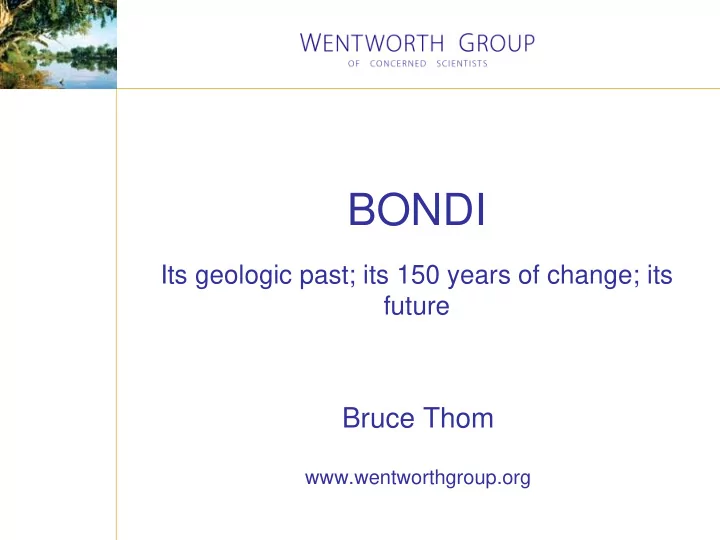

BONDI Its geologic past; its 150 years of change; its future Bruce Thom www.wentworthgroup.org
Why is Bondi so iconic? • Proximity • East Australian Current • Sydney climate • Topographic setting • Geology- geomorphology
Geological Evolution STEP 1 Fold-Belts 500-300 my
Geological Evolution STEP 2 Sydney Sedimentary Basin 300-200 my Volcanic intrusions 150 my
Geological Evolution STEP 3 Opening Tasman Sea 80 – 60 my
Geological Evolution STEP 4 • Subsidence continental margin • River valley incision 60-10 my
Geological Evolution STEP 5 • Continental sea-level rise • Planation inner continental shelf • Formation of cliffs • Sand migration to north 10 - <1 my
Geological Evolution STEP 6 • Last Interglacial to Last Glacial Maximum • High to low sea level (-120m) 140,000 – 15, 000 yr
Geological Evolution STEP 7 Postglacial Marine Transgression to “Stillstand” 15,000 – 6,500 yr 6,500yr – to present day beach-barrier-lagoon
Inner Shelf Sand Bodies 3 stage development 12,000 yr 7,000 yr Present sea level
Beach Dynamics Closed compartment of quartz sand Rip cell dominated
Pre-European Occupation Shelf plain Beach to estuary Rock platform to cliff
Early European Land Grants Roberts “Bundye” 1811 -1851 Hall/O’Brien 1851 -1882 Public Resumption 1882 Council Trustee 1885
Late 19 th Century Destabilize dunes Sewer Outfall 1889 Attempts to stabilize dunes Infill lagoons
Early 20 th century Continued stabilization Baths Completion of Promenade 1923 Dune removal - subdivision
Mermaid Rock Ben Buckler Rock platforms Storm events July 1912 Origins of The Rock
Mid 20 th Century Piers Real estate consolidation World War II
Late 20 th century events May – June storms 1974 November Storm 1987 (2007) Sewer Outfall offshore Olympic Stadium 2000
Bondi Today Resilient dynamic closed system
A Sustainable Future? Can Bondi adapt to impacts of climate change? Need for nourishment: when? Collapse of cliffs: when?
Thank you www.wentworthgroup.org www.australiancoastalsociety.org
Recommend
More recommend